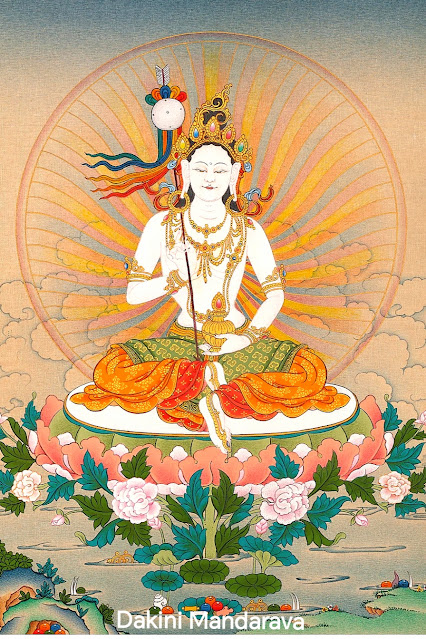Deity yoga engages creative visualization as a skillful means of personal transformation through which the practitioner (sadhaka) visualizes a chosen deity (yidam) as part of a mandala or refuge tree in order to transform their experience of the appearance aspect of reality.
The yoga of activity is to accomplish, through the light radiating from mantras, the four The yoga of activity is to accomplish, through the light radiating from mantras, the four activities that the Buddha undertook to turn the wheel of Dharma and deliver sentient beings from suffering.
For example, in the practice of Vajrasattva, visualize the heart mantra of Vajrasattva radiating light and, on top of the light, abundant offerings to Buddhas and Bodhisattvas in the ten directions, and receiving blessings from deities in the ten directions.
Donations for our Buddhist research and development.
For example, in the practice of Vajrasattva, visualize the heart mantra of Vajrasattva radiating light and, on top of the light, abundant offerings to Buddhas and Bodhisattvas in the ten directions, and receiving blessings from deities in the ten directions.
When the light is absorbed back; then visualize again the mantra radiating light downwards to shine on sentient beings in the six realms, especially those in the three lower realms, so as to eliminate their suffering. These are the activities of the deity.
Our activities in everyday life can be transformed into those of the Buddha through the yoga of activity.The sadhana of Vajrasattva contains these four yogas: first visualize Vajrasattva; next visualize the mantra on the moon disc and recite the hundred-syllable mantra; then visualize the light emanating from the mantra, etc.
Because this practice is part of the preliminaries, it does not particularly emphasize the idea of emptiness, but actually, the state of emptiness is also needed for this practice.
People often ask which yidam practice they should do or who their own yidam is. The fact is, there is no way to do the yidam practice if one doesn’t know how to practice the generation stage, and there will be no result if the quality of the generation stage is not up to standard.On the other hand, if one has practiced the preliminaries well and undertakes the generation stage seriously, one can hope to attain some results from the yidam practice as well.
Do you earnestly cherish our devoted work? Assuming this is the case, we are delighted that you are finding our blog useful and valuable. Would you consider making a donation for our Buddhist research and development?We need your help to secure the future of scholarly interaction with Buddhism. Since our very first publication of Dharma works and activities in 2008, we have been effortlessly providing free distribution of Dharma posts and articles throughout the previous 16 years.
We have exceptionally constrained support and do not receive subsidies or funding from people in general.
Please help us develop our Dharma activities that will not only benefit you but all Dharma readers on the planet. Please consider showing your support. Your generosity will certainly help us enhance our work and accomplish more for a better and brighter future.
Thank you for reading. May you find peace and great bliss. With your support, it helps to spread the Buddha’s precious teachings and turn the Dharma wheels in the world.
For those in whom the precious Bodhichitta has not arisen
May it arise and not decrease.
But increase further and further.
Dedication of Merit
By this merit, may we then obtain omniscience then.
Having defeated the enemies wrongdoings
May we liberate migratory from the ocean of existence.
With its stormy waves of birth, old age, sickness, and death.
*Note
I do not own or infringe any copyright on the picture(s).
Picture(s) courtesy and credit to the rightful distributors and/or studios
The picture(s) are intended for editorial use only.












